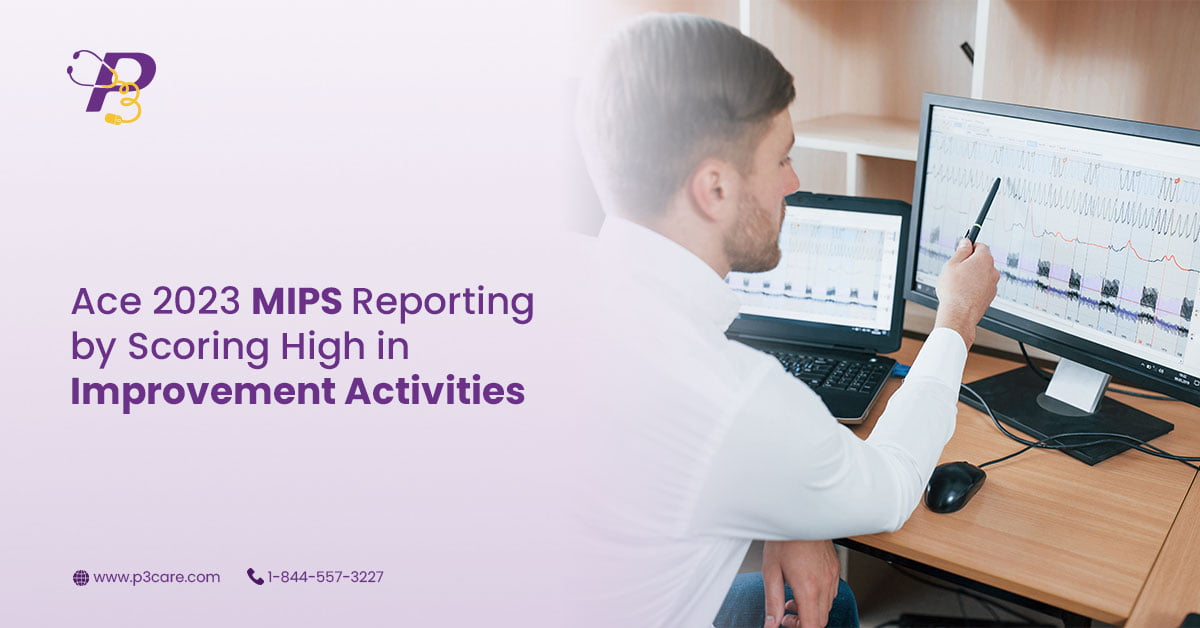What’s ONC-certified health IT? Why Do We Require it for MIPS 2023 Reporting?
Today, advanced IT has become an integral need for everybody. That’s why every sector has integrated modern technology as a fundamental aspect. Likewise, the healthcare sector is no exception to this trend. Healthcare practices find it difficult to handle significant PHI in their systems. Therefore, they need reliable and secure means to gather, store, and share this data. So, we can observe a growing inclination among providers to adopt EHR systems. Not only this, but CMS has also mandated the use of certified EHRs for MIPS 2023 measure reporting.
In this blog, we will get a close insight into the ONC certification process. Also, we will become familiar with the advantages of utilizing certified EHR technology in MIPS reporting.
The rule for Measure Reporting in MIPS 2023
“For measure reporting in MIPS 2023, CMS requires the use of Certified EHRs.“
With time, EHR technology has made progressive advancements. All of this has prompted the ONC to establish a set of national standards. These guidelines guarantee the safe access, sharing, and use of electronic health information. Therefore, the EHRs must adhere to the regulations to receive voluntary certification.
Thus, a MIPS-qualified registry must also be an ONC-certified health IT vendor for MIPS 2023. Otherwise, CMS won’t accept the MIPS reporting data. Back in PY 2020, CMS informed providers about the use of certified EHR technology. Also, it has provided ample time for modifying internal systems. As per ease, either they have implemented EHRs in their internal system or outsourced for their needs.
Get to Know the ONC Certification Program
The ONC Certification Program started in 2010. Through the Certification program, ONC has set forth the national standards for healthcare IT. The standard guidelines also apply to electronic health record systems. Healthcare organizations are integrating EHRs, preferably these days, to fulfill MIPS 2023 requirements. The ONC Certification Program assures that the practice is HIPAA compliant. In other words, it guarantees that the practice has strict checks on data security and interoperability.
What is the motto of the ONC Certification Program?
The main motto of ONC was to certify health IT only. However, they wanted to make technology readily available for use in federal, state, and private initiatives in the long run. So it has finally accomplished its purpose.
Have a look at the programs that have shown trust in this certification program. Thereby, they have mandated the use of ONC-certified health IT.
- Centers for Medicare & Medicaid Services (CMS)
- Promoting Interoperability (PI) Programs
- Merit-based Incentive Payment System (MIPS)
Third-party ONC-Authorized Certification Bodies (ONC-ACBs)
ONC-ACBs are authorized by the ONC to evaluate health IT solutions. Mainly, they determine their compliance with the Certification Program’s requirements.
How do I get ONC certification?
Achieving ONC certification is not that easy. It necessitates a comprehensive testing and evaluation process for health IT systems. This process verifies the following necessarily:
- System’s ability to handle patient information effectively.
- being meaningfully utilized by healthcare providers
- Whether it meets specific technical prerequisites
To get the ONC certification, the IT system must satisfy every test successfully. The following ONC-ACB entities can certify health IT solutions within the Certification Program:
- Drummond Group
- Leidos, Inc.
- SLI Compliance (a Division of Gaming Laboratories International, LLC)
How has the ONC Certification Program Evolved?
The ONC regularly publishes updated versions of the certification requirements. These revisions enhance the provision of healthcare services while ensuring compliance with legal requirements.
- The ONC first developed core criteria for the usability, interoperability, functionality, and security of EHRs.
- Later versions seek to improve EHR functionality and foster interoperability.
- Recent changes have focused on two primary issues in particular:
- Keeping information from being blocked
- transmission of health information that is seamless
The ONC has released three revisions of its standards for health IT certification since its inception:
- 2011 Edition (expired)
- 2014 Edition (expired)
- 2015 Edition
Note: CMS has addressed the MIPS 2023 participants’ need to use certified EHRs with the 2015 Cures Edition.
The Cures Act
The 21st Century Cures Act
The 2015 Edition Health IT certification standards underwent extensive adjustments as a result of interoperability, information blocking, and the ONC Health IT Certification Programme Final Rule (ONC Cures Act Final Rule). The ONC Cures Act Final Rule intends to encourage innovation and improve healthcare delivery while giving patients more control over their health data. Focus areas of the Cures Act include the following:
- Encouraging interoperability
- Eliminating information blockages
- Enhancing patient access to their EHR
The Need for ONC-certified Health IT for MIPS 2023 Reporting
The use of ONC-certified health IT in MIPS 2023 reporting is advantageous for several reasons:
Compliance with Regulatory Requirements
MIPS requires healthcare providers to demonstrate the use of certified EHR technology. It is part of the Promoting Interoperability performance category. The ONC certification ensures that the health IT systems meet the criteria specified by the ONC. It perfectly complies with regulatory standards, such as the requirements outlined in the MACRA.
Meaningful Use of EHRs
ONC-certified health IT promotes the meaningful use of EHRs. Thereby, it enables providers to leverage the functionalities of the EHR systems effectively. MIPS reporting requires the use of EHRs for various tasks, such as:
- Capturing and reporting clinical quality measures,
- Implementing clinical decision support and
- Engaging patients in their care, etc.
The certified technology ensures that the EHR systems have the necessary capabilities to support these requirements.
Interoperability and Data Exchange
Interoperability is a crucial aspect of MIPS reporting, as it facilitates the exchange of patient data across different healthcare settings and systems. ONC-certified health IT promotes interoperability by adhering to standardized data formats and protocols, enabling seamless data exchange between healthcare providers. This interoperability supports care coordination, reduces redundancies, and enhances the accuracy and completeness of patient data used for MIPS reporting.
Quality Reporting and Performance Improvement
MIPS reporting requires healthcare providers to report on various quality measures. So, they demonstrate improvement over time by doing so. ONC-certified health IT systems often include functionalities for data analytics, reporting, and performance monitoring. These features allow providers to track their performance and identify areas for improvement. Afterward, they implement strategies to enhance the quality of care they deliver. By utilizing certified health IT, providers can streamline their reporting processes and gain valuable insights into their performance.
Incentive Payments
MIPS offers financial incentives to eligible healthcare professionals. To be eligible for these incentive payments, healthcare providers must meet certain reporting requirements. It also includes the use of ONC-certified health IT in the Promoting Interoperability category. By utilizing certified technology, providers can ensure their compliance with MIPS requirements. As a result, they maximize their chances of earning incentives.
Conclusion
The requirement for ONC-certified health IT in MIPS 2023 reporting ensures the use of advanced technology. It supports meaningful use and promotes interoperability while facilitating data exchange. Also, it enables quality reporting and performance improvement and enhances eligibility for incentive payments. By leveraging certified health IT, healthcare providers can streamline their reporting processes. They can improve the quality of care and contribute to the goal of advancing healthcare outcomes for Medicare patients.














Leave a Reply
Want to join the discussion?Feel free to contribute!